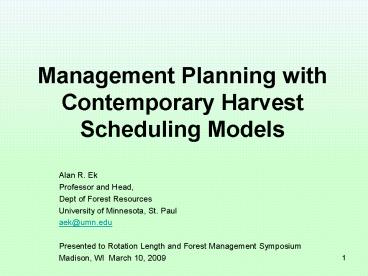Management Planning with Contemporary Harvest Scheduling Models - PowerPoint PPT Presentation
1 / 34
Title: Management Planning with Contemporary Harvest Scheduling Models
1
Management Planning with Contemporary Harvest
Scheduling Models
- Alan R. Ek
- Professor and Head,
- Dept of Forest Resources
- University of Minnesota, St. Paul
- aek_at_umn.edu
- Presented to Rotation Length and Forest
Management Symposium - Madison, WI March 10, 2009
2
The schedule
- Dynamics of forest change and timber supply in
the region (WI MN, MI) - Implications of change for management and
outputsthe regulated forest - Essentials of management and harvest scheduling
what, why, how (and who) - Examples of WI situation
- Synthesis
3
Dynamics of forest change
- ? Post glacial forests
- ? Native American influence
- ? Forest Types
- -Northern Mixed forest
- pine, spruce, aspen, birch...
- -Southern Broadleaf forest
- oak, hickory, maple
- ? Early logging 1850 1930s
- ? Regrowth, restoration,
- ? Evolving forest industry and
- resource management
- ? Today
- Global forest based industry
- Sustainable forest management
4
Northern Wisconsin 1912-1990s
1988
Yesforests do change!
5
Change in WI Timberland acreage
6
All SpeciesTimberland Acreage, WI
7
Implications of Change
- Fluctuations in
- timber supply by species, size, quality
- investment potentials and investor interest
- income for landowners
- habitat within and across ownerships
- forest management costs
8
Essentials of Harvest and management Scheduling
Models
- What? Yes! Harvest and management scheduling
models - Why?
- Develop much improved plans and operations as
compared to simple regulation models and/or
group grope approaches - Provide a framework for guiding the planning
process - Facilitates incorporation of non timber
considerations in the forest management situation - Develop truly thoughtful and defensible plans
- Speed the planning process, especially for
updates - Allow sensitivity analysis on practices,
constraints, and policies - Compare alternative allowable harvest levels
- Consider alternative management investment
strategies
9
Planning as a management tool
- Some possible treatments / gains
- Site preparation
- Improved planting stock
- Early release from competition
- Pre-commercial thinning
- Commercial thinnings
- Final harvest
- Residual biomass harvest
10
Planning as a management tool
- How? Optimization ModelsSpecialized algorithms
for finding maxima and minima in complex resource
allocation problems, e.g., - For say a 50 year planning period,
- the model chooses a set of stands to be treated,
treatments to apply, and time periods for such
applications, - to maximize outputs ( or timber) compared to
other alternatives, - subject to constraints (e.g., limits or bounds on
operational capabilities, timber flow, green up,
location, habitat, etc.)
11
Planning as a management tool
- Who?
- National and Global Companies
- Superior and Chippewa NF
- State of MN
- Minnesota counties (Interagency Info Coop)
- Nordic Countries
- New Zealand
12
Planning as a management tool
- Models/Software
- Spectrum - USFS
- Habplan - NCASI
- Dual Plan DPSpace U of Minnesota
- Metla/JLP Finland
- FPS Western US
13
Some WI Covertype Cases
- Problem areas
- Uneven distribution of acres by age class
- Reduced regeneration capacity by age
- Succession to other covertypes
- Forest health issues with aging
- Market fluctuations
14
Example - Jack Pine
15
Jack Pine Management
16
Example - Red Pine
17
Example - White pine
18
Example - Black spruce
19
Example - Tamarack
20
Example - Northern white-cedar
21
Oak-hickory group
22
Example - Elm-ash-cottonwood group
23
Example - Maple-beech-birch group
24
Example - Paper birch
25
Example - Aspen
26
Aspen Management
27
Harvesting Today
28
Example of rotation age as a management question
that can be consider by scheduling modelsTrial
for WI Aspen for 100 yrsRotation age 30-100
years
Based on FACCS, a Forest Age Class Change
Simulator by A. Ek and G. Domke, U of Minnesota
29
Trial for WI Aspen for 100 yrsRotation age
40-110 years
30
Trial for WI Aspen for 100 yrsRotation age
50-120 years
31
FACCS Model Rotation Age Trials for Aspen in WI
(100 yr period)Summary
ODT Oven dry tonsapproximately 1.2 cords
32
Summary
- Forest planning is complex and requires forest
planning model tools to achieve full
effectiveness. - Application of these tools to Wisconsin forest
ownerships is appropriate and timely. - Results of such model based planning applications
is inclusive, defensible, and truly insightful
planning that can avoid or mitigate many issues
before they become problems and take advantage of
opportunities for both ecological and economic
interests. - Go for it!
- Questions?
33
References
- Ek, A. R. 2007. Strategies for Improving forest
productivity in Minnesota. http//iic.gis.umn.edu/
documents/forestproductivity.pdf - G. M. Domke, A. R. Ek, M. A. Kilgore and A. J.
David. 2008. Aspen in the Lake States A
research review. NCASI Technical Bulletin No.
955. Research Triangle Park, NC. 32p. - Perry, C. H. and V. A. Everson. 2008.
Wisconsins Forest Resources 2007. Res. Note.
NRS-26. Newtown Square, PA USDA Forest Service,
Northern Research Station. 4p. - Remsoft? Inc. 2008. Remsoft Spatial Planning
System 2008. Fredericton, NewBrunswick, Canada.
- Walters, D.K., A.R. Ek.1993. Whole Stand Yield
and Density Equations for Fourteen Forest Types
in Minnesota. Northern Journal of Applied
Forestry, 10(2)75-85. - Wisconsin DNR. Timber Harvest in Wisconsin.
http//www.dnr.state.wi.us/forestry/um/pdf/report/
TimberHarvestWisconsin.pdf
34
NoteWI Aspen empirical yield/acre (ODT)from
2005 FIA Data






























